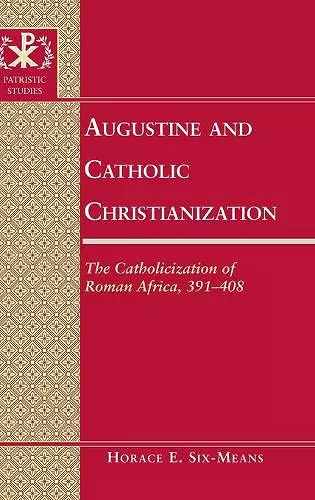Augustine and Catholic Christianization
The Catholicization of Roman Africa, 391-408
Horace E Six-Means author Gerald Bray editor
Format:Hardback
Publisher:Peter Lang Publishing Inc
Published:31st Jul '11
Currently unavailable, and unfortunately no date known when it will be back

A religious reformation occurred in the Roman Empire of the fourth and fifth centuries which scholars often call Christianization. Examining evidence relevant to Roman Africa of this period, this book sharpens understanding of this religious revolution. Focusing on the activities of Augustine and his colleagues from Augustine’s ordination as a priest in 391, to the fall of the Emperor Honorius’ master of soldiers, Stilicho, in 408, it proposes Catholicization as a term to more precisely characterize the process of change observed. Augustine and Catholic Christianization argues that at the end of the fourth and beginning of the fifth century Augustine emerged as the key manager in the campaign to Catholicize Roman Africa by virtue of a comprehensive strategy to persuade or suppress rivals, which notably included Donatists, Arians, Manichees, and various kinds of polytheism. Select sermons from 403 and 404 reveal that Augustine’s rhetoric was multivalent. It addressed the populus and the elite, Christians and non-Christians, Catholics, and Donatists.
Key sources examined are selected laws of the Theodosian Code, the Canons of the African Council of Catholic Bishops, Augustine’s Dolbeau sermons (discovered in 1990), Contra Cresconium, as well as other sermons, letters, and treatises of Augustine. This book clarifies our perception of Augustine and Christianity in the socio-religious landscape of Late Roman Africa in at least three ways. First, it combines theological investigation of the sources and development of Augustine’s ecclesiology with sociohistorical tracing of the process of Catholicization. Second, an account of the evolution of Augustine’s self-understanding as a bishop is given along with the development of his strategy for Catholicization. Third, Augustine is identified as resembling modern political «spin-doctors» in that he was a brilliant spokesperson, but he did not work alone; he was a team player. In brief, Augustine influenced and was influenced by his fellow bishops within Catholic circles.
ISBN: 9781433108044
Dimensions: unknown
Weight: 420g
214 pages
New edition